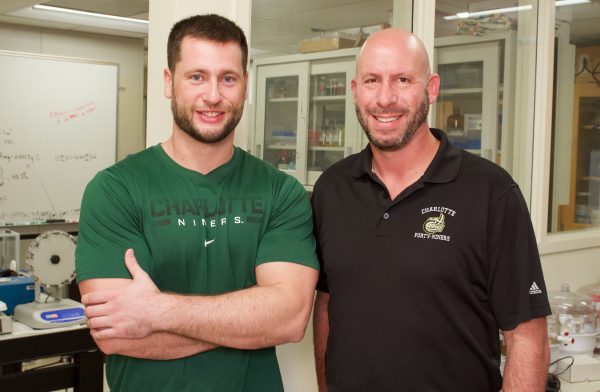Graduate Student Turns to Nanoscience to Seek Clean Water Solutions

As people worldwide cry out for safe drinking water, UNC Charlotte master’s degree student Billy Johnson has discovered a way to help, through nanoscience.
Working with his UNC Charlotte faculty mentor Jordan Poler, Johnson has developed a novel nanomaterial they believe can push science forward in the removal of certain potential carcinogens from water. Last fall, Johnson received the Thomas D. Walsh Graduate Research Fellowship to support his work.
“I’m passionate about preserving our environment, and doing my part to make sure that future generations get to breathe clean air, and drink clean water,” Johnson says. “Our society relies heavily on processes that are detrimental to the environment, and we’re already starting to see some of the effects in the form of climate change. We have to focus on resolving the environmental issues.”
All active water resources contain natural organic matter. These compounds, specifically humic and fulvic acids, pose a potential health hazard. Modern water treatment techniques depend upon chlorine to destroy bacterial pathogens. However, the natural organic matter reacts with the chlorine to form disinfection byproducts with human health risks.
“Natural organic matter is found in all active water sources, so we need to remove it before the water treatment process,” Johnson says. “This NanoResin, as we call it, has proven to be more effective than the currently available products. Also, our NanoResin can be readily regenerated and reused by simply adding it to a brine solution, or salt water. It’s a sustainable solution to a difficult environmental problem.”
Nanoscale science focuses on materials that range from about 1-100 nanometers. A nanometer is about 1/1000th the thickness of a hair. For nanomaterials to work, they must be assembled into useful structures, such as a carbon nanotube, or nano-sized cylinder of carbon atoms.
Creating Useful Materials to Address Pressing Issues
“In our research group, we focus on fundamental systems at the nanoscale with regard to applications of materials on the macroscale,” Poler says. “So we’re more of a materials science group, creating useful materials with applications in mind. Our material of choice is nanostructured carbon, or more specifically, carbon nanotubes. Carbon nanotubes are the strongest materials known to man, and they have an extremely high aspect ratio with nearly unrivaled specific surface area. However, they are not dispersible in water, so they immediately aggregate and are effectively useless.”
To tackle this problem, Johnson developed hybrid nanoparticles that use the nanotubes as scaffolding for a hydrophilic polymer. The nanotubes can then be dispersed into the aqueous systems. The anion-exchange resin polymer conforms itself to the immense surface area of the nanotubes, coating the nanotubes and removing the contaminants from the water.
 The researchers have seen significant decreases in contaminant concentration, even at very low concentrations of the contaminants. Their studies suggest that their nanomaterial is three times more efficient than currently available removal technologies.
The researchers have seen significant decreases in contaminant concentration, even at very low concentrations of the contaminants. Their studies suggest that their nanomaterial is three times more efficient than currently available removal technologies.
Johnson and Poler believe they have a product that could eventually make it into water treatment facilities as a viable solution. They are preparing an academic paper for publication and exploring options for the material.
The Poler Research Group works with students from the Nanoscale Science and the Optical Science and Engineering doctoral programs, the Chemistry master’s program and undergraduates from Chemistry, Physics and Optical Science, Biological Sciences, Engineering, and Mathematics and Statistics. High school students also join the team from time to time.
“Dr. Poler continually pushes us to grow as scientists, and takes every opportunity to teach us,” Johnson says. “I have grown immensely as a scientist and his mentoring has been the driving force behind that.”
Poler saw potential in Johnson from the first class Johnson took with Poler. He has seen Johnson continue to grow as a researcher and leader as Johnson taught general chemistry labs and in the research group.
“He started strong in the lab and showed dedication to safety, attention to detail, and being productive,” Poler says. “He has developed into a very competent and creative research student. I expect him to find success at all stages of his career.”
The work Poler does with Johnson and other students continues not only to advance science, but to also grow students.
“I believe the path toward success starts with being an effective, purposeful, and compelling communicator,” Poler says. “Beyond the laboratory, our students need guidance developing their careers. I work closely with my students to help them prepare for poster and oral presentations. My mantra to them is that everything you write, or draw, or say should be purposeful. Every chart, table, picture, or graph should be presented as if it was going into your thesis, or dissertation, or a publication, or your Nobel Prize acceptance speech.”
Poler considers each student’s needs when acting as a mentor. One thing that remains constant is a focus on experiential learning.
“The importance of an open-ended research experience for students is critical,” he says. “Getting students into our research labs is transformative for them. I am always amazed at their growth and their development toward independent thought.”
For Johnson, the potential for his work to make its way into water treatment plants holds special meaning. After earning his bachelor’s degree in Chemistry at UNC Charlotte in 2011, he worked as a chemistry technician at a water treatment facility in Gastonia. He then worked in quality assurance at Special Metals Welding Products Company before beginning his graduate studies in fall 2014. He plans to pursue a doctorate in a materials chemistry program focusing on environmental issues.
“I arrived at that field of study based on my passion for chemistry, but I also wanted to have applications in mind when developing new materials,” he says. “Materials science can be looked at as the link between fundamental studies of the physical sciences and engineering. I’m focusing on environmental issues because this is the only planet we get. If we destroy this one, there isn’t a backup.”
Words: Brittany Algiere | Image: Lynn Roberson